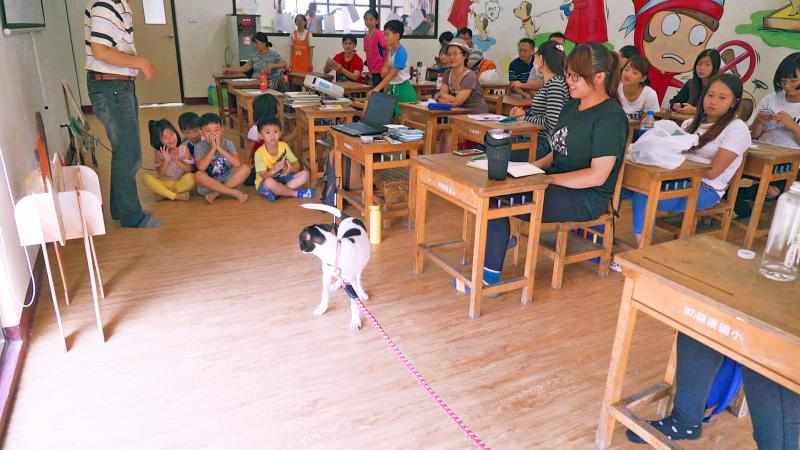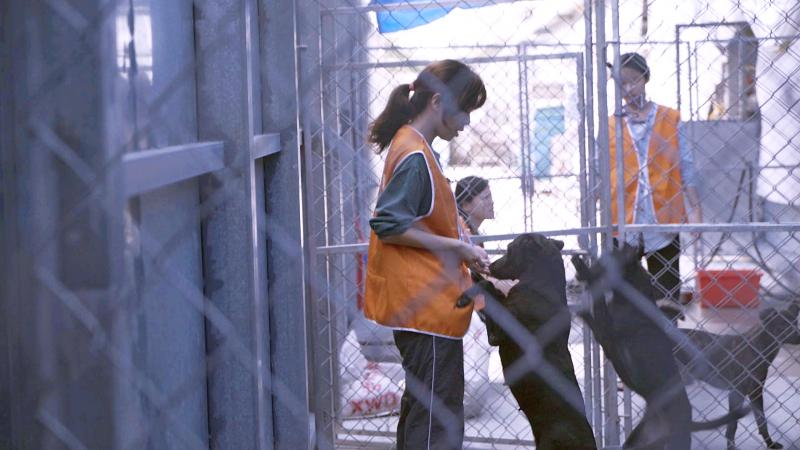The sequel to the highly influential 2013 documentary Twelve Nights (十 二夜) probably won’t have as much impact or emotional sway as its predecessor, even though the issues it tackles are arguably more relevant and urgent.
Shot almost entirely in a government shelter from the perspective of the dogs, Twelve Nights was meant to shock the public so as to draw attention to the plight of stray animals.
With big-name author and filmmaker Giddens Ko (柯景騰), better known as Jiu Ba Dao (九把刀) attached as producer, the documentary’s title referred to a law, since changed, that allowed shelters to euthanize animals if they were not claimed or adopted within 12 days of public notice. It grossed NT$62 million in box office sales as awareness soared, which eventually led to the government enacting no-kill legislation for shelter animals in 2015. The euthanasia ban took effect in February 2017.

Photo courtesy of Activator Marketing Company
Given the situation today, it’s clear that Taiwan was unprepared for this hastily pushed through change. In fact, the adoption rate dropped that year (perhaps since people were no longer worried about animals being put down) and shelters became horribly overcrowded, while irresponsible owners continued to abandon their pets. Puppy mills remained an issue, and owners not spaying or neutering their dogs also contributed to the large number of strays. Proper pet ownership education remained lacking.
Raye, the director, faced criticism after the first film for just showing the plight of the animals without explaining the difficulties and challenges faced by the shelter workers and animal welfare activists. This sequel feels like a redemption of sorts, as it actively addresses all the aforementioned problems and follows the humans who dedicate their lives to solving them. Going “back to day zero” in this sense, means returning to the root of the issue.
Raye captured the public’s attention last time by pulling at their heartstrings. This time she clearly and systematically explains the various issues, and how they can be resolved. As she says in an interview: “There’s no need to show scary images to the audience this time.”

Photo courtesy of Activator Marketing Company
Crowdfunded by 4,941 donors and shot over three years, this is arguably a much more ambitious venture as Raye travels across Taiwan examining the situation of various shelters, following sterilization advocates as well as trap, neuter and release workers, and attending animal education workshops for children. She also travels to the US, Japan and Austria to see how they operate their shelters and educate the public on proper pet ownership behavior.
The film takes on a comparatively light-hearted tone as we see extremely dedicated staff waiting for hours in camouflage to capture an unspayed dog, volunteers trying hard to reign in their emotions while negotiating with obstinate owners and passionate educators who have children roleplay as strays. Foreign and Taiwanese experts are shown discussing the situation at forums, and the conclusion seems to be that it just takes time and effort for societal change to happen. The euthanasia ban was not a miracle cure but just the beginning, and this sequel strives to reinforce that idea.
There are still poignant scenes of sad-looking stray puppies and dogs in overcrowded shelter cages throughout the film, as well as owners who say things like they wouldn’t abandon their pooch “as long as it is healthy” — but this emotional fodder is toned down for more amusing or eye-opening situations set to upbeat music. It’s definitely not as riveting as the first film, but it’s still interesting and illuminating even to someone who is familiar with the issues. Plus, it still has the big name support with renowned director Wu Nien-jen (吳念真) providing the narration and veteran crooner Michael Wong (光良) providing the theme song pro bono.
Perhaps most importantly, there’s a glimmer of hope with items such as the completion of the state-of-the-art, bright and welcoming Houli Animal Shelter in Taichung, set to open at the end of the year, as well as the ongoing innovative educational programs at Kaohsiung’s Yanchao Animal Shelter.
Hopefully the film can bank on the success of its predecessor and attract more than just people already concerned about animal rights. It will surely not generate as much hype, but that’s not what society needs. It needs more people to comprehensively understand the problem and act on that understanding.

June 9 to June 15 A photo of two men riding trendy high-wheel Penny-Farthing bicycles past a Qing Dynasty gate aptly captures the essence of Taipei in 1897 — a newly colonized city on the cusp of great change. The Japanese began making significant modifications to the cityscape in 1899, tearing down Qing-era structures, widening boulevards and installing Western-style infrastructure and buildings. The photographer, Minosuke Imamura, only spent a year in Taiwan as a cartographer for the governor-general’s office, but he left behind a treasure trove of 130 images showing life at the onset of Japanese rule, spanning July 1897 to

One of the most important gripes that Taiwanese have about the Democratic Progressive Party (DPP) is that it has failed to deliver concretely on higher wages, housing prices and other bread-and-butter issues. The parallel complaint is that the DPP cares only about glamor issues, such as removing markers of Chinese Nationalist Party (KMT) colonialism by renaming them, or what the KMT codes as “de-Sinification.” Once again, as a critical election looms, the DPP is presenting evidence for that charge. The KMT was quick to jump on the recent proposal of the Ministry of the Interior (MOI) to rename roads that symbolize

On the evening of June 1, Control Yuan Secretary-General Lee Chun-yi (李俊俋) apologized and resigned in disgrace. His crime was instructing his driver to use a Control Yuan vehicle to transport his dog to a pet grooming salon. The Control Yuan is the government branch that investigates, audits and impeaches government officials for, among other things, misuse of government funds, so his misuse of a government vehicle was highly inappropriate. If this story were told to anyone living in the golden era of swaggering gangsters, flashy nouveau riche businessmen, and corrupt “black gold” politics of the 1980s and 1990s, they would have laughed.

In an interview posted online by United Daily News (UDN) on May 26, current Chinese Nationalist Party (KMT) Chairman Eric Chu (朱立倫) was asked about Taichung Mayor Lu Shiow-yen (盧秀燕) replacing him as party chair. Though not yet officially running, by the customs of Taiwan politics, Lu has been signalling she is both running for party chair and to be the party’s 2028 presidential candidate. She told an international media outlet that she was considering a run. She also gave a speech in Keelung on national priorities and foreign affairs. For details, see the May 23 edition of this column,